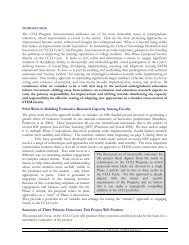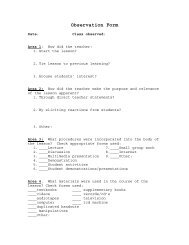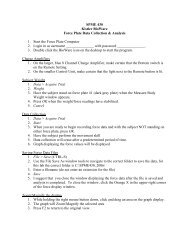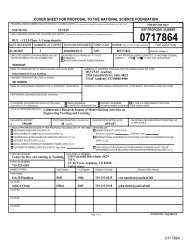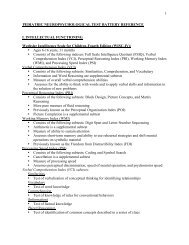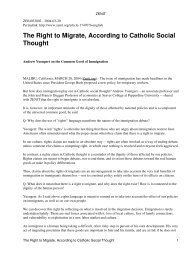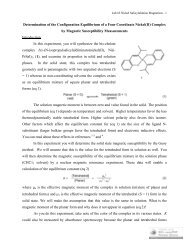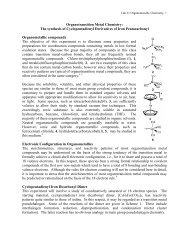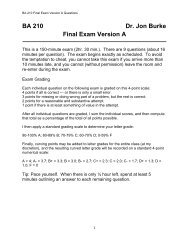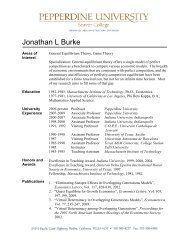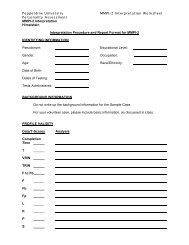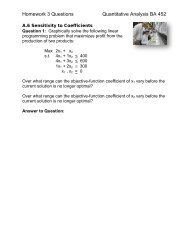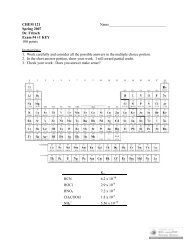CONFIDENTIAL TEST REPORT Name: Peter Practice Gender: Male ...
CONFIDENTIAL TEST REPORT Name: Peter Practice Gender: Male ...
CONFIDENTIAL TEST REPORT Name: Peter Practice Gender: Male ...
Create successful ePaper yourself
Turn your PDF publications into a flip-book with our unique Google optimized e-Paper software.
<strong>Peter</strong> P. 3is concerned that any medical schools he applies to will only “crunch the numbers” andnot look at his case personally.<strong>Peter</strong> reported that he is currently in good health, and he has never beenhospitalized or suffered any major illnesses. He did break his arm when he was 6 yearsold, and his foot when he was 22 years old. He reported that he recovered completelyfrom these injuries. <strong>Peter</strong>’s father had a history of heart trouble. Although his father hadbeen a world-class athlete at one time, he was also a heavy smoker, and consequently,suffered his first heart attack when <strong>Peter</strong> was in the second grade. <strong>Peter</strong>’s father hadthree more heart attacks following the first one over a 15-year period, with the final onebeing fatal. As mentioned previously, <strong>Peter</strong>’s father also suffered from melanomacancer. <strong>Peter</strong>’s mother has a history of gastrointestinal problems, including having hergallbladder surgically removed two years prior to <strong>Peter</strong>’s birth. Subsequent to <strong>Peter</strong>’sbirth, <strong>Peter</strong>’s mother wanted to have another child. She managed to conceive eighttimes, but each of those pregnancies ended in miscarriage. <strong>Peter</strong> reported that at leasttwo of those pregnancies progressed to eight months.Four months following his father’s death, <strong>Peter</strong> sought psychological counselingat the university’s student counseling center. Some of <strong>Peter</strong>’s relatives had remarkedthat <strong>Peter</strong> did not seem to be responding to his father’s death well. He had never reallycried, and several of his relatives felt he needed psychological help. He reported that hefelt nothing regarding his father’s death, and still has never cried. He also reporteddrinking quite a bit for several months following his father’s death. The actual event ofhis father’s death had been quite traumatic for <strong>Peter</strong>. He and his mother had just pickedhis father up from a doctor’s appointment, and were taking him home when his father
<strong>Peter</strong> P. 4had a massive heart attack in the car. <strong>Peter</strong> tried to perform cardio-pulmonaryresuscitation, but was unsuccessful in his attempts to revive his father.This was one day following <strong>Peter</strong>’s 21st birthday. <strong>Peter</strong> reported that he suffereda traumatic event each year within one day of his birthday from the time he was 18years old. When he turned 18, his brother was in an automobile accident. When heturned 19, <strong>Peter</strong> was in an automobile accident. When he turned 20, a very dearneighbor passed away. And finally, the day following his 21st birthday, his father died.When <strong>Peter</strong> sought therapy, he had tried to explain to the therapist why he was seekingcounseling, but in the course of the intake interview, <strong>Peter</strong> revealed that he had someissues surrounding his sexual orientation. <strong>Peter</strong> felt that the therapist was moreinterested in pursuing the issues surrounding <strong>Peter</strong>’s sexual orientation rather than theproblems that <strong>Peter</strong> had presented to him. Unfortunately, <strong>Peter</strong> felt his needs were notbeing met, and after a few sessions, he discontinued treatment.<strong>Peter</strong>’s half-brother, who is eleven years older than <strong>Peter</strong>, attempted suicide atage 16. He overdosed on a bottle of Librium, an antianxiety medication. He was rushedto the hospital by his parents, and subsequently hospitalized for a few days. <strong>Peter</strong>believes his brother attempted suicide because he was experiencing some severesocial problems. His brother is highly gifted, and had been advanced two grades inelementary school. <strong>Peter</strong> reported that his brother did not fit in with his olderclassmates, and suffered quite a bit of social rejection because of this. The Librium hisbrother had used in his suicide attempt belonged to <strong>Peter</strong>’s maternal grandmother.<strong>Peter</strong> described her as a “hypochondriac.” He stated that she is constantly concernedabout her health, and has taken antianxiety medications for as long as he canremember.
<strong>Peter</strong> P. 5<strong>Peter</strong> stated that the relationship between his mother and his grandmother isquite strained. They argue frequently. <strong>Peter</strong> reported that he was much closer to hisfather than he is to his mother. He stated that he shared many things with his father thathe felt he could never tell his mother. Even though he does not feel as close to hismother, he feels he has a responsibility to take care of her now that his father isdeceased. <strong>Peter</strong> had tried to move into his own apartment when his father was ill withthe cancer, but felt that he was needed at home. After his father died, his brother told<strong>Peter</strong> it was <strong>Peter</strong>’s responsibility to care for their mother, and <strong>Peter</strong> concurred.<strong>Peter</strong> is currently dating a young man his age, and reported that over the yearshe has had a few serious relationships. He stated that he began dating girls in juniorhigh school, and had his first sexual encounter with a male in high school; however, hedid not label this relationship as a “boyfriend.” His first serious sexual relationship waswith a girl was during his senior year of high school. In college he has dated both menand women, but his only serious relationships have been with men. <strong>Peter</strong> reports that,while he considers himself bisexual, his most meaningful relationships tend to be withmen. He also remarked that he has higher standards for the men he dates than for thewomen he dates. He also reported that, while his father knew of his sexuality, he cannotever imagine telling his mother. He felt that his father’s love was unconditional, but hefeels that his mother is judgmental, and that he has to “win her affection.”<strong>Peter</strong> reported that he has many friends, but that his closest friends have alwaysbeen with people several years older than himself. He also is actively involved in themusic program at his university. He has always enjoyed music, and has had manystrong friendships that he has made in musical groups and programs. He also enjoys
<strong>Peter</strong> P. 6the more solitary aspect of spending a few hours practicing or just noodling on thepiano. He sees music as a wonderful stress reliever as well as an excellent social outlet.Mental Status Exam<strong>Peter</strong> <strong>Practice</strong> is a highly intelligent, 23-year-old Caucasian male. He was neatlygroomed, casually dressed, and wore glasses to correct for an astigmatism. Hemaintained eye contact throughout the interview and testing process, and spoke clearlyat all times. His predominant mood was relaxed and his affect was appropriate at alltimes. He seemed comfortable answering even the more personal questions. Histhoughts and memories were fluid. He remained on the topic of the questions askeduntil he had completed his answer. Throughout the evaluation, he evidenced no mentaldisorders. He is oriented x3 (to person, place, and time) and is of above averageintelligence. His concentration and memory appear normal. He was able to easily recalldetails of his childhood as well as current events in his life. His judgment appearssound, and he appears to have a good sense of himself and his goals.<strong>Peter</strong> was quite interested in the testing procedure and complied with all requeststhe examiner made. He was very attentive to his performance and wanted to be surethat he was providing the examiner with appropriate test participation. He was curiousabout the tests and what they were measuring, but understood the restrictions inrevealing his results placed on the examiner due to lack of expertise and licensure.Profile ValidityAll tests administered in this battery should be considered valid. <strong>Peter</strong> attendedto all of the administrations equally, and approached each test seriously. After a reviewof the validity scales, and other pertinent information, it is apparent that <strong>Peter</strong>’s MMPI-2scores represent a valid profile. He completed the instrument in 1 hour and 10 minutes,
<strong>Peter</strong> P. 7and omitted no items. Also in support of a valid profile, there were few erasure marksand no extraneous pencil marks on the answer sheet.When considering <strong>Peter</strong>’s Validity Scale profile, in addition to showing potentialpositive qualities, it appears that he approached the instrument with moderate levels ofdefensiveness, and that he most likely attempted to minimize difficulties and present anoverly favorable image of himself (Validity Scales: F, T=42; F B , T=46; F P , T=41; L, T=56;K, T=58; S, T=64). While <strong>Peter</strong>’s socioeconomic and educational background may becontributing to this profile, it is likely that he was trying to give an appearance ofadequacy and effectiveness, and was therefore somewhat defensive. He also appearedto be particularly cautious and deliberate in his approach to the items (Validity Scale:VRIN, T=34).<strong>Peter</strong>’s approach to the TAT may also be considered somewhat defensive. Hecompleted an 11-card administration in 50 minutes. Overall, he spent time on severalcards describing details within card before beginning the story, and in some cases,during the middle of a story. Because of this, in general, many of the stories are somewhat disjointed – they do not have a smooth, natural flow to them. While <strong>Peter</strong>’sresponses on the CSC appear honest and thoughtful, he completed this instrument inapproximately 15 minutes, which indicates that he most likely did not invest a great dealof thought and intrapersonal insight into his responses. This could be interpreted tosuggest that <strong>Peter</strong> approached the CSC in a defensive manner also.On the MMPI-2, <strong>Peter</strong> responded very consistently throughout the test (ValidityScales: VRIN, T=34; TRIN, T=50). He also attended to the last portion of the test in thesame valid mode of responding as he did in the first portion of the test (Validity Scales:F, T=42; F B , T=46). <strong>Peter</strong>’s style of response on the TAT and CSC was also very
<strong>Peter</strong> P. 8consistent throughout each test. The only example in which he exhibited what might beconsidered inconsistency was in his drawings on the HTP. On this test, his tree and hisperson drawings were fairly basic, with little detail. Although his tree has a little animal ina hole in the trunk, it is a very simple drawing of a tree. His person is also a somewhatsimple cartoon character. His house, on the other hand, took considerably more time tocomplete, and looks more like an architect’s schematic. The house seems to have beenapproached with a different style of drawing as well as concept.Adjustment Level<strong>Peter</strong> appears to be a well-adjusted young man. His recent history reveals thathe has experienced some very psychologically distressing events, and while it appearsthat the loss of his father had a significant impact on his life, he seems to be returning tothe strengths and successes he enjoyed before his father’s death. Some of his previousdifficulties might be reflected in his response to MMPI-2 Koss-Butcher critical items suchas: “I have had periods of days, weeks, or months when I couldn’t take care of thingsbecause I couldn’t ‘get going’.” <strong>Peter</strong> is a responsible individual who gets along well withothers. He is self-confident, quite competitive and work oriented, and highly intelligent(Validity Scale: S, T=64; Supplementary Scales: Es, T=63; Do, T=65). <strong>Peter</strong> most likelyputs himself under a great deal of pressure to succeed. This is evident in theendorsement of the following critical item: “I work under a great deal of stress.” This isalso supported in some of his CSC responses: Failure . . . “is not an option.” I worry . . .“too much.” His recent excellent academic performance, his enjoyment of his work, andhis active social life show that <strong>Peter</strong> is currently functioning at a very high level.
<strong>Peter</strong> P. 9SymptomsOverall, <strong>Peter</strong> seems to be well adjusted, and he is not currently suffering fromany significant psychological distress (MMPI-2 Clinical Scales: 1, T=42; 2, T=35; 3,T=52; 4, T=57; 6, T=53; 7, T=45; 8, T=49; 9, T=51). The area in which <strong>Peter</strong> seems tobe experiencing some distress is in his family relationships (MMPI-2 Content Scale:FAM, T=55; Content Component Scale: FAM 1 , T=60; Supplementary Scale: MDS,T=57). <strong>Peter</strong> stated in his interview that his relationship with his mother is not as closeas the relationship he shared with his father. He went as far as to say that he is alwaystrying to “win her affection.” He also is not able to be as open with her as he was withhis father. It appears that he experiences this as family discord, and that he does notfeel understood and supported by his family. He sees his family as loving, but it seemsthat his greatest family ally was lost with the death of his father. This is reflected in hisCSC responses: My family . . . “is very diverse and loving.” During my childhood, . . .“my father was the bomb.” Mother . . . “is a very strong person.”Major Needs<strong>Peter</strong> has suffered a great deal of trauma the past several years, oddly enough,in close proximity to his birthday, the culmination of which was his father’s death twoyears ago. While he seems strong enough to weather life’s storms (MMPI-2Supplementary Scale: Es, T=63), and outward appearances suggest that <strong>Peter</strong>’s life isback on track with his return to academic and social success, he himself reported thathe has never really cried or felt anything with regard to his father’s death. Most likely hehas repressed some very powerful feelings because when his father died, not only didhe lose his father, but also he lost his only ally within the family, and from allappearances, one of his best friends. Even though in his CSC responses <strong>Peter</strong> stated,
<strong>Peter</strong> P. 10I’d like to forget . . . “my dad’s ordeal,” at some point, he will probably need to addressthese feelings and allow them to be experienced.<strong>Peter</strong> also seems to have some ambivalent feelings toward his mother. He doesnot feel that he can share his sexual orientation with her, and he somehow feels that hecontinually has to “win her affection.” However, at the same time, it is very clear that heis devoted to his mother. He feels it is his responsibility to take care of her, and toremain at home when most young men of his age and culture are venturing out into theworld on their own. These ambivalent feelings will probably need to be addressed atsome point, and hopefully in the future, <strong>Peter</strong> will be able to strike a balance betweenthe responsibility he feels toward his mother as well as find a way to assert his ownindependence.Perceptions of the Environment<strong>Peter</strong>’s overall profile portrays him as an individual who feels safe andcomfortable in his environment. His HTP person drawing is of a happy looking cartoonfigure. When asked how this person is feeling and why, <strong>Peter</strong> responded: “Happy,because things are going his way.” His CSC responses also support this: My friends . . .“are understanding.” My home . . . “is where I am loved and feel good.” As mentionedpreviously, this last statement is contradicted by other material that suggests <strong>Peter</strong> isexperiencing some distress in his family relationships (MMPI-2 Content Scale: FAM,T=55; Content Component Scale: FAM 1 , T=60; Supplementary Scale: MDS, T=57). It ispossible that the source of <strong>Peter</strong>’s familial distress could be his inability to be open withhis mother regarding his sexual identity, and his feelings that he must “win heraffection.” <strong>Peter</strong> was very open and quite loquacious during his interview. It must bequite difficult for him to sensor himself, and conceal so much of his life from his mother.
<strong>Peter</strong> P. 11Reactions to Stress<strong>Peter</strong> seems to have internal as well as external resources to cope with problemsand stressors in his life (MMPI-2 Supplementary Scale: Es, T=63). He has a very strongsupport network in his many friends, and he has an excellent outlet in his musicalinterests. However, <strong>Peter</strong> most likely has difficulty expressing anger and feelings offrustration (Supplementary Scale: O-H, T=65). <strong>Peter</strong>’s CSC statement, Heavy drinking .. . “is bad – but sometimes needed,” in combination with his use of alcohol to selfmedicatefollowing his father’s death do pose some reason for concern. It would beimportant to ascertain if the maladaptive use of alcohol to self-medicate is a pattern for<strong>Peter</strong>. He also seems to have unrealistic expectations of himself. This is supported bythe CSC statement: Failure . . . “is not an option.”Self-concept<strong>Peter</strong>’s self-concept is very positive (MMPI-2 Supplementary Scale: Es, T=63;Do, T=65; Content Scale: LSE, T= 41). Although he has had some academic failures inthe past few years, it seems apparent that <strong>Peter</strong> realizes that these failures were due tothe turmoil and distress he was experiencing during his father’s illness and death.However, he has not allowed these failures to stop him from pursuing his desire to be adoctor, and, in the past year, he has returned to his previous level of superior academicperformance. His CSC responses also reflect his strong self-concept: People usuallythink . . . “I am funny and smart.” My future . . . “is great and will be fun.” I do well . . . “atmost intellectual activities.” My moral principles . . . “are strong and important.” While allof these statements are probably true for <strong>Peter</strong>, he most likely has moments when he isnot so sure of himself, and some of the darkness of his father’s ordeal revisits him. This
<strong>Peter</strong> P. 12is reflected in his endorsement of the following MMPI-2 Koss-Butcher critical item: “Thefuture seems hopeless to me.”Sexual Identification<strong>Peter</strong> is an intelligent, expressive, and individualistic young man. He exhibits agreat deal of interpersonal sensitivity, and he enjoys a wide variety of aesthetic interestsincluding cooking, fine dining, and art. He also appears to exercise good common sensein his daily decision making (MMPI-2 Clinical Scale: 5, T=64; Supplementary Scales:GM, T=50 & GF, T=59). All of these things are indicative of his socio-economic statusas well as his educational level.In his interview, <strong>Peter</strong> described himself as bisexual, and stated that he iscurrently dating a young man his age. He also stated in his CSC responses, If I were . .. “not bi, I’d be boring.” While <strong>Peter</strong> seems outwardly comfortable with his sexualidentity, he does appear to have some concerns, as can be evidenced in his feelingsthat he cannot share this information with his mother. <strong>Peter</strong> responded with several TATscenarios that contained homosexual, or gender ambivalent elements. In fact, one of hisTAT responses perhaps reflects his concern regarding how his own mother wouldrespond to discovering his sexuality: “He’s said something shocking to her like he’s gayor he just killed someone.” It perhaps reveals a certain level of internalized homophobiathat he has equated being gay with committing murder, and that someone might find therevelation of those two secrets equally shocking.Emotional Control<strong>Peter</strong> is an individual who tends not to express angry or sad emotions (MMPI-2Supplementary Scale: O-H, T=65). This is apparent in his own admission that he neverhas been able to express any emotions, or cry over the death of his father. After his
<strong>Peter</strong> P. 13father’s death, rather than facing his emotions, he turned to alcohol as a way to numbhis feelings and protect himself from what must have been very powerful feelings. Evenhis TAT responses seem to avoid confronting emotions completely. In some of hisresponses he would stop abruptly in the middle of an emotionally powerful description tocomment on the clothes the characters were wearing, or the room that served as thesetting. <strong>Peter</strong> endorsed a few MMPI-2 Koss-Butcher critical items that suggest he hasdifficulty finding ways to alleviate some of the pressure of his bottled up emotions: “Attimes I feel like smashing things.” “I work under a great deal of stress.”Interpersonal RelationshipsThis is an area of <strong>Peter</strong>’s life in which his profile is quite mixed. <strong>Peter</strong> is asociable, outgoing, gregarious, and friendly individual. He enjoys being around otherpeople, values friendship, and is quite comfortable engaging in conversation with peoplehe does not know (MMPI-2 Clinical Scale: 0, T=32; Supplementary Scale: Es, T=63; Do,T=65; Content Scale: LSE, T= 41). <strong>Peter</strong> is also an individual who has high moral andethical standards and feels a responsibility to carry his own share of burdens and duties(MMPI-2 Supplementary Scale: Re, T=61). This is supported in his own words in hisCSC responses: My moral principles . . . “are strong and important.” I always . . . “try tosee both sides.” His CSC responses also suggest that <strong>Peter</strong> enjoys and relies upon hisfriends: My friends . . . “are understanding.” I feel miserable . . . “when people are madat me.”In contrast to this, while he clearly feels responsible for caring for his mother, hisfamily relationships do not seem to be as supportive and accepting as <strong>Peter</strong> would likethem to be (MMPI-2 Content Scale: FAM, T=55; Content Component Scale: FAM 1 ,T=60; Supplementary Scale: MDS, T=57). <strong>Peter</strong> feels that he cannot share his sexual
<strong>Peter</strong> P. 14identity with his mother, and he feels that her love is not unconditional, rather somethinghe needs to “win.” The following CSC response suggests that he is somewhatambivalent about his family relationships: My home . . . “is where I am loved and feelgood.”Psychological ResourcesOverall, <strong>Peter</strong> appears to have an optimistic, balanced view of life. In his CSCresponses he spoke of his future as great and fun, and of being alone as something thatis good at times. While it is likely that <strong>Peter</strong> represses some of his emotions (MMPI-2Supplementary Scale: O-H, T=65), this tendency does not appear to be maladaptive atthis time. With his music, he has made certain that he has outlets in place to deal withany stress he encounters in his daily life. As he stated himself, he has a very strongfriendship network that provide him with a support system. His CSC responses alsoreflect this: My friends . . . “are understanding.” <strong>Peter</strong> also seems to enjoy a level of selfreflection:I frequently . . . “wonder and self analyze.”Dynamics and Etiology<strong>Peter</strong> has clearly faced some very emotionally difficult and traumaticexperiences. The death of his father was obviously a tremendous loss for <strong>Peter</strong>.However, while he had a very difficult time initially adjusting to this loss, he appears tohave found some way to integrate it into his life in a way so that he can move forward.He has a tremendous intellect, a great deal of ego strength, and a very strong sense ofself that have helped him weather difficult times.While he clearly loves and respects her, <strong>Peter</strong>’s relationship with his mother doesnot appear to meet his needs in the way that his relationship with his father did. Hisbelief that he must keep his sexual identity hidden from her must be a tremendous
<strong>Peter</strong> P. 15strain, especially when considering the fact that they live under the same roof. It seemsthat this tension will continue to gradually build as time passes, and the ways in which<strong>Peter</strong> addresses this building tension in the future may be of great importance.Diagnostic ImpressionsDSM-IV-TR Multiaxial Classification:Axis I: V71.09 No diagnosis or Condition on Axis IAxis II: V71.09 No diagnosis on Axis IIAxis III:Axis IV:Axis V:NoneGAF = 90 (current)Death of father, academic problemsDiscussion:While it appears from information provided in the interview that <strong>Peter</strong> mostlikely was suffering from an Adjustment Disorder during the last year of his father’s life,as well as the year following his death, <strong>Peter</strong> does seem to have recovered from thosedifficulties. At this time, <strong>Peter</strong>’s relationship with his mother appears to have somepatterns of interaction that are somewhat maladaptive. While this is not causing anyclinically significant impairment, it does seem to be contributing to communicationproblems.Treatment Indications and ImplicationsWhile intervention is not vital for <strong>Peter</strong> at this time, he would undoubtedly benefitfrom psychodynamic oriented therapy (MMPI-2 Supplementary Scale: Es, T=63;Content Scale: TRT, T=35). He has excellent coping skills that have helped him achievegreat strides academically. And while he did have a difficult time adjusting to his father’sillness and eventual death, he appears to have steered his life back on track. <strong>Peter</strong> also
<strong>Peter</strong> P. 16has very useful tools at his disposal for stress management, and a supportive socialnetwork. He has an optimistic view of life, and seems excited to meet its challenges.While he enjoys being alone, he is not socially isolated. <strong>Peter</strong> also seems to enjoy acertain level of self-reflection that would be particularly enhanced through therapy. Thisis supported in his CSC statement: I frequently . . . “wonder and self analyze.”In support of therapy, <strong>Peter</strong> has very obvious mixed feelings toward his motherwhich he may not fully understand. He also has never fully addressed his feelings ofloss following his father’s death. Finally, while he was resistant to addressing his sexualorientation the first time he attempted therapy, it does appear that he would benefit fromexamining some of his issues surrounding this, including what seems to be thepresence of internalized homophobia. Even though he did not seem to benefit fromtherapy the first time he attempted it, with a therapist that is sensitive to his needs hemay very well gain a great deal of insight through a positive therapy experience. <strong>Peter</strong> isan intelligent, high-functioning young man, and with a satisfactory therapeuticrelationship, his potential for great happiness would be strong.ExaminerDate



